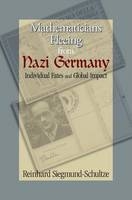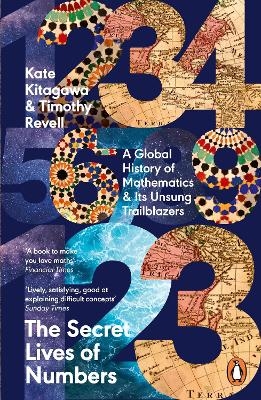Mathematicians Fleeing from Nazi Germany
Princeton University Press (Verlag)
978-0-691-12593-0 (ISBN)
- Titel ist leider vergriffen;
keine Neuauflage - Artikel merken
The emigration of mathematicians from Europe during the Nazi era signaled an irrevocable and important historical shift for the international mathematics world. "Mathematicians Fleeing from Nazi Germany" is the first thoroughly documented account of this exodus. In this greatly expanded translation of the 1998 German edition, Reinhard Siegmund-Schultze describes the flight of more than 140 mathematicians, their reasons for leaving, the political and economic issues involved, the reception of these emigrants by various countries, and the emigrants' continuing contributions to mathematics. The influx of these brilliant thinkers to other nations profoundly reconfigured the mathematics world and vaulted the United States into a new leadership role in mathematics research. Based on archival sources that have never been examined before, the book discusses the preeminent emigrant mathematicians of the period, including Emmy Noether, John von Neumann, Hermann Weyl, and many others. The author explores the mechanisms of the expulsion of mathematicians from Germany, the emigrants' acculturation to their new host countries, and the fates of those mathematicians forced to stay behind.
The book reveals the alienation and solidarity of the emigrants, and investigates the global development of mathematics as a consequence of their radical migration. An in-depth yet accessible look at mathematics both as a scientific enterprise and human endeavor, "Mathematicians Fleeing from Nazi Germany" provides a vivid picture of a critical chapter in the history of international science.
Reinhard Siegmund-Schultze is professor of the history of mathematics at the University of Agder, Kristiansand, in Norway.
List of Figures and Tables xiii Preface xvii Chapter 1: The Terms "German-Speaking Mathematician," "Forced," and "Voluntary Emigration" 1 Chapter 2: The Notion of "Mathematician" Plus Quantitative Figures on Persecution 13 Chapter 3: Early Emigration 30 3.1. The Push-Factor 32 3.2. The Pull-Factor 36 3.D. Documents 40 3.D.1. The Economic Troubles in German Science as a Stimulus to Emigration 40 3.D.2. National Isolation, Xenophobia, and Anti-Semitism as European Phenomena 42 3.D.3. Personal Risks with Early Emigration 45 3.D.4. The Ambiguous Interconnection between Social Hierarchies, Traditions at Home, and Internationalization in Mathematics 46 3.D.5. The American Interest in Immigration (Pull-Factor) 47 3.D.6. The Start of Economic Problems in America around 1930 Foreshadowing Later Problems Incurred during Forced Emigration 51 3.S. Case Studies 52 3.S.1. The Failed Appointments of C. Carathodory and S. Bochner at Harvard 52 3.S.2. Early Emigration from Austria as Exemplified by Karl Menger 53 3.S.3. The Problems of Early Emigration as Exemplified by Hermann Weyl 56 Chapter 4: Pretexts, Forms, and the Extent of Emigration and Persecution 59 4.1. The Nazi Policy of Expulsion 60 4.2. The Political Position of Mathematicians, Affected and Unaffected by Persecution 66 4.D. Documents 72 4.D.1. The Pseudo-Legalism of the Methods of Expulsion 72 4.D.2. Student Boycotts as a Means of Expelling Unwanted Docents 72 4.D.3. The Racist "German Mathematics" (Deutsche Mathematik) of Ludwig Bieberbach as an Ideology Supportive of the Expulsions 73 4.D.4. Personal Denunciations as Instruments of Expulsion 73 4.D.5. Political Reasons for Emigration beyond Anti-Semitism 77 4.D.6. Cheating Emigrants out of Their Pensions 79 4.D.7. Increasing Restrictions Imposed upon "Non-Aryan" Students 80 4.D.8. Political Position of Emigrants before 1933: German Nationalism, Illusions, and General Lack of Prescience 80 4.D.9. First Reactions by the Victims: Readiness to Compromise and to Justify, Adoption of the Martyr's Role 83 4.D.10. The Partial Identity of Interests between the Regime and the "Unaffected" German Mathematicians 86 4.D.11. Reactions to the Expulsions from Abroad 88 Chapter 5: Obstacles to Emigration out of Germany after 1933, Failed Escape, and Death 90 5.D. Documents 92 5.D.1. Obstacles to Emigration from Germany 92 5.D.2. Unsuccessful Attempts at Emigration, Mathematicians Murdered 94 Chapter 6: Alternative (Non-American) Host Countries 102 6.D. Documents and Problems Pertaining to the Various--Often Temporary--Host Countries outside of the United States 104 Chapter 7: Diminishing Ties with Germany and Self-Image of the Refugees 149 7.D. Documents 152 7.D.1. Concern for the Fate of Relatives Left Behind 152 7.D.2. The Emotional Ties to Germany and to German Mathematics on the Part of the Emigrants 153 7.D.3. Maintenance and Gradual Restriction of the Emigrants' Personal and Scientific Relations to Germany 156 7.D.4. Conflicting Opinions on Mathematicians Remaining in Germany and on Those Who Returned in Spite of Chances Abroad 157 7.D.5. Political Information, Caution, and Self-Censorship in the Contact between Emigrants and Mathematicians Remaining in Germany 160 7.D.6. Condemnation of Former Colleagues' Commitment to the Nazis by Emigrants 162 7.D.7. Self-Selection by Emigrants 165 7.S. Case Studies 167 7.S.1. Richard Courant's Gradual Estrangement from Germany 167 7.S.2. Concern for the Future of German Applied Mathematics and the Young Generation: Richard von Mises and Theodor von Krmn Supporting Walter Tollmien's Return to Germany 171 7.S.3. Controversial Judgments about the Return of an Established Mathematician to Germany: Eberhard Hopf 175 7.S.4. The Lack of Demarcation toward Mathematicians Remaining in Germany: The Example of Gumbel's Only Partially Successful Book Free Science (1938) 176 7.S.5. The Aftereffects of Previous Political Conflicts in Emigration: The Case Rudolf Lneburg 180 Chapter 8: The American Reaction to Immigration: Help and Xenophobia 186 8.1. General Trends in American Immigration Policies 186 8.2. Consequences for the Immigration of Scholars 189 8.3. The Relief Organizations, Particularly in the United States 192 8.D. Documents 204 8.D.1. Competition on the American Job Market and Attempts to Keep the Immigrants away from America 204 8.D.2. "Selection" of Immigrants to Be Promoted and Bureaucratic Obstacles on the Part of the Americans 205 8.D.3. Special Problems for Female Immigrants 207 8.D.4. Political Mistrust on the American Side 207 8.D.5. The Priority of Private Foundations and Pure Research Institutions in Helping the Immigrants 208 8.D.6. The Restricted Scope and Possibilities Available to the German Mathematicians' Relief Fund 209 8.D.7. Further Motives for Xenophobia: Mental Borders, Anti-Semitism, Differences in the Science Systems, Professional Jealousy 210 8.D.8. Decline of Xenophobia in Connection with Political Events on the Eve of World War II 213 8.S. Case Studies 214 8.S.1. The Case of the Female Emigrant Emmy Noether 214 8.S.2. A Case of the Exploitation of Immigrants by an Engineer at Cornell (M. G. Malti) 217 8.S.3 Five Case Studies about Academic Anti-Semitism in the USA 218 8.S.3.1. Consideration of anti-Semitism in the policies of the relief organizations 218 8.S.3.2. Examples of American nationalist and racist propaganda aimed at immigrants 219 8.S.3.3. Problems in relationships between assimilated (in particular baptized) and Orthodox Jews in America 219 8.S.3.4. The anti-Semitism of George David Birkhoff 223 8.S.3.5. Declining academic anti-Semitism in the USA after 1945 228 Chapter 9: Acculturation, Political Adaptation, and the American Entrance into the War 230 9.1. General Problems of Acculturation 231 9.2. Political Adaptation 233 9.3. Problems of Adaptation in Teaching and Research 235 9.4. Age-Related Problems and Pensions 236 9.5. The Influence of War Conditions 236 9.D. Documents 237 9.D.1. The General Requirement of "Adaptability" 237 9.D.2. Problems Arising from the Loss of Status Due to Emigration and from the Widespread Principle of Seniority in Academic Promotions 240 9.D.3. Different Traditions in Teaching and Unfamiliar Teaching Loads 242 9.D.4. Extraordinary Solutions for Outstanding Immigrants 243 9.D.5. Individualistic European versus Cooperative American Working Style 245 9.D.6. Problems of Moral Prudishness in the United States: The Extreme Case of Carl Ludwig Siegel 247 9.D.7. Language Problems 248 9.D.8. The Need for Publications in the Language of the Host Country 248 9.D.9. Support by Immigrants for Economic and Social Reform, in Particular for New Deal Positions 249 9.D.10. Pressure to Adapt Politically and Political Mistrust against Immigrants on the Part of the Americans 250 9.D.11. Waning Political Restraint on Immigrants after Obtaining American Citizenship and the Impact of the American Entrance into the War 252 9.D.12. Personal Failure of Immigrants in the United States, Due to Age- and Pension-Related Problems 257 9.S. Case Studies 259 9.S.1. The Tragic Fate of a Political Emigrant: Emil Julius Gumbel 259 9.S.2. A Case of Failed Accommodation by an Older Immigrant: Felix Bernstein 262 Chapter 10: The Impact of Immigration on American Mathematics 267 10.1. The "Impact of Immigration" Viewed from Various Global, Biographical, National, or Nonmathematical Perspectives 270 10.2. The Institutional and Organizational Impact 276 10.3. The Impact of German-Speaking Immigration in Applied Mathematics 278 10.4. The Inner-Mathematical Impact of German-Speaking Immigration on the United States 284 10.5. The Impact of the "Noether School" and of German Algebra in General 285 10.6. Differences in Mentality, the History and Foundations of Mathematics 294 10.D. Documents 296 10.D.1. The Heterogeneity of the "German-Speaking" Emigration, in Particular Differences between German and Austrian Traditions in Mathematics 296 10.D.2. Losses for Germany 297 10.D.3. The Profits of Emigration for International Communication 297 10.D.4. Impact of the Institutional Side of German Mathematics (Educational System, Libraries) 298 10.D.5. The Development of New Mathematical Centers in the United States 298 10.D.6. Inner-Mathematical Impact on Individual Disciplines 300 10.S. Case Studies 310 10.S.1. The Failure of Richard Brauer's Book on Algebra in 1935, or the Paradoxical Victory of "Talmudic Mathematics" Due to Nazi Rule 310 10.S.2. Late American Criticism of "German Algebra," a Controversy between Garrett Birkhoff and B. L. van der Waerden in the 1970s and Commentary by G.-C. Rota in 1989 315 Chapter 11: Epilogue: The Postwar Relationship of German and American Mathematicians 319 11.D. Documents 327 11.D.1. The New Wave of Emigration after the War 327 11.D.2. Remigration and Obstacles to It 327 11.D.3. Resumption of Scientific Communication 328 11.D.4. Compensation for the Emigrants 329 11.D.5. Political "Coping with the Past" ("Vergangenheitsbewltigung") 331 11.S. Case Study 337 11.S.1. A Case of Failed Compensation: Max Dehn 337 Appendix 1: Lists of Emigrated (after 1933), Murdered, and Otherwise Persecuted German-Speaking Mathematicians (as of 2008) 341 1.1. List of German-Speaking Mathematicians Who Emigrated during the Nazi Period (First Generation) 343 1.2. List of German-Speaking Mathematicians Who Were Murdered or Driven to Suicide by the Nazis 358 1.3. List of German-Speaking Mathematicians Persecuted in Other Manners (Includes Teachers of Mathematics and Is Probably Incomplete) 360 Appendix 2: Excerpt from a Letter by George David Birkhoff rom Paris (1928) to His Colleague-Mathematicians at Harvard Concerning the Possibility of or Desirability to Hire Foreigners 366 Appendix 3.1: Report Compiled by Harald Bohr "Together with Different German Friends" in May 1933 Concerning the Present Conditions in German Universities, in Particular with Regard to Mathematics and Theoretical Physics 368 Appendix 3.2: Translation of a Letter from Professor Karl Lowner of the University of Prague to Professor Louis L. Silverman (Dartmouth College) Dated August 2, 1933 372 Appendix 3.3: Richard von Mises's "Position toward the Events of Our Time" in November 1933 374 Appendix 3.4: Report by Artur Rosenthal (Heidelberg) from June 1935 on the Boycott of His and Heinrich Liebmann's Mathematical Courses 376 Appendix 3.5: Max Pinl--Later the Author of Pioneering Reports (1969-72) on Mathematical Refugees--in a Letter to Hermann Weyl on the Situation in Czechoslovakia Immediately after the Munich Dictate of September 29, 1938 378 Appendix 4.1: A Letter by Emmy Noether of January 1935 to the Emergency Committee in New York Regarding Her Scientific and Political Interests during Emigration 380 Appendix 4.2: Richard Courant's Resignation from the German Mathematicians'Association DMV in 1935 381 Appendix 4.3: Von Mises in His Diary about His Second Emigration, from Turkey to the USA, in 1939 383 Appendix 4.4: Hermann Weyl to Harlow Shapley on June 5, 1943, Concerning the Problems of the Immigrant from Gottingen, Felix Bernstein 388 Appendix 5.1: Richard Courant in October 1945 to the American Authorities Who Were Responsible for German Scientific Reparation 390 Appendix 5.2: Max Dehn's Refusal to Rejoin the German Mathematicians' Association DMV in 1948 393 Appendix 6: Memoirs for My Children (1933/1988) by Peter Thullen 394 Archives, Unprinted Sources, and Their Abbreviations 415 References 421 Photographs Index and Credits 445 Subject Index 449 Name Index 461
| Zusatzinfo | 59 halftones. 1 table. |
|---|---|
| Verlagsort | New Jersey |
| Sprache | englisch |
| Maße | 152 x 235 mm |
| Gewicht | 851 g |
| Themenwelt | Mathematik / Informatik ► Mathematik ► Geschichte der Mathematik |
| ISBN-10 | 0-691-12593-7 / 0691125937 |
| ISBN-13 | 978-0-691-12593-0 / 9780691125930 |
| Zustand | Neuware |
| Haben Sie eine Frage zum Produkt? |
aus dem Bereich




